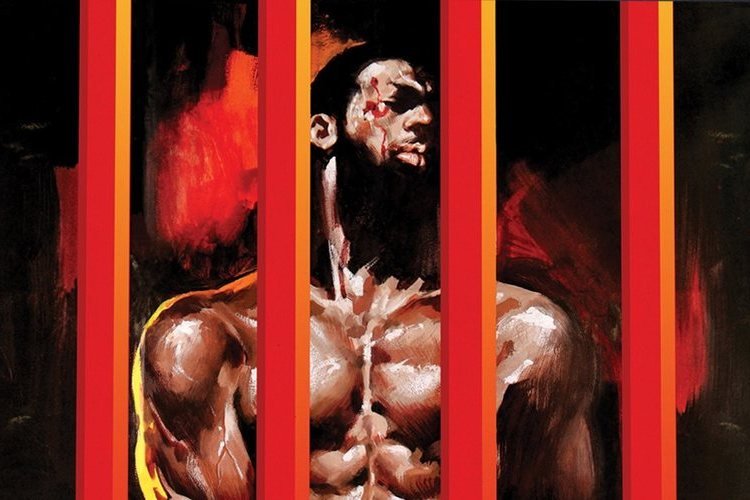PENITENTIARY: Bustin' Out With Jamaa Fanaka
Jamaa Fanaka isn't thought of as a top name in black filmmaking history, perhaps because he made films that could be considered exploitation fare, but he was a true pioneer. He entered the UCLA Film School in the early '70s and played a key role in what was known as the L.A. Rebellion, advancing the vanguard of black filmmakers by making three feature films while still a student and getting them all distributed. The last of those films was Penitentiary, which became a big hit at the box office and spawned two Fanaka-helmed sequels.Like all of Fanaka's films, Penitentiary is wild, personal, often surreal and delivers entertainment laced with provocative themes. The protagonist is Martell Gordone (Leon Isaac Kennedy), a drifter who finds himself sent to prison under shady and mysterious circumstances. He proves his fighting abilities when resident con Half Dead (Badja Djola) tries to assault him on his first night, also earning the nickname "Too Sweet" when he takes his foe's candy bars.This attracts the attention of Lt. Armsworth (Chuck Mitchell), who encourages Too Sweet to join in the prison-sponsored boxing tournament. This can lead to special favors and a reduction in sentence. He decides to do so and earns the assistance of Seldom Seen (Floyd "Wildcat" Chatman), an eccentric veteran con who joins his cause as trainer. As Too Sweet fights his way towards success and potential freedom, he earns the dangerous enmity of current prison boxing champ Jesse Amos (Donovan Womack) and uncovers the reason he ended up in prison.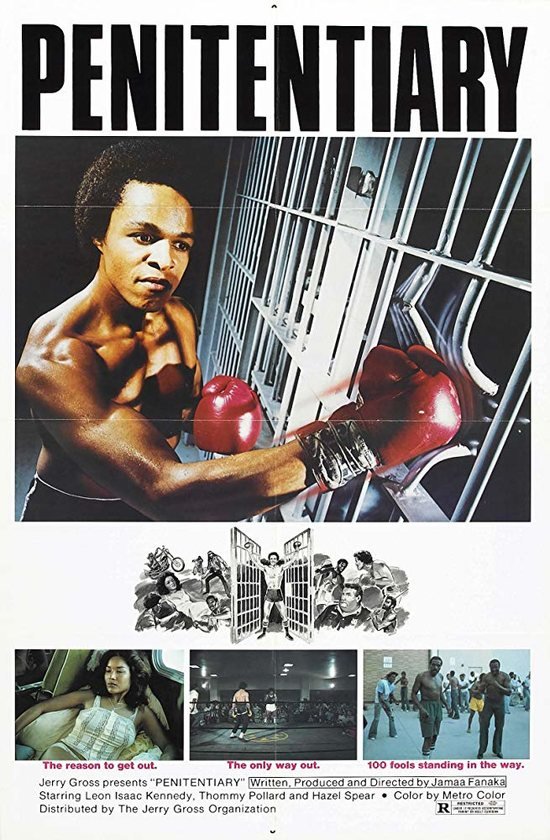 The above synopsis makes the film sound more straightforward than it actually is. Penintentiary overflows with the kind of weirdness that defies a simple story description. A prologue with Too Sweet in the outside world shows a prostitute who drives a van and lands her clients via C.B. radio. A funk band with floorshow dancers plays in the prison yard. Convicts from a female prison attend the boxing matches, which leads to a subplot involving a male con who sneaks into the women's bathroom to pursue sexual trysts with a female con. A cheering section for Too Sweet is led by an out-and-proud transvestite, played by the inimitable Wilbur "Hi-Fi" White. Touches like these add a feverishly imaginative texture to the contours of the story.A synopsis also can't capture the film's tonal complexity. Fanaka leans into the weirdness of his story, embracing sudden shifts from comedy to drama to action to social commentary. Abrupt tonal transitions like that can often deep-six a film's effectiveness but in Penitentiary it just adds to its unique ambience. The hero's world has been suddenly turned upside down so it makes sense if it feels like we're following him through a strange underworld where we're laughing one moment, flinching the next and feeling like our consciousness is being altered throughout the experience.
The above synopsis makes the film sound more straightforward than it actually is. Penintentiary overflows with the kind of weirdness that defies a simple story description. A prologue with Too Sweet in the outside world shows a prostitute who drives a van and lands her clients via C.B. radio. A funk band with floorshow dancers plays in the prison yard. Convicts from a female prison attend the boxing matches, which leads to a subplot involving a male con who sneaks into the women's bathroom to pursue sexual trysts with a female con. A cheering section for Too Sweet is led by an out-and-proud transvestite, played by the inimitable Wilbur "Hi-Fi" White. Touches like these add a feverishly imaginative texture to the contours of the story.A synopsis also can't capture the film's tonal complexity. Fanaka leans into the weirdness of his story, embracing sudden shifts from comedy to drama to action to social commentary. Abrupt tonal transitions like that can often deep-six a film's effectiveness but in Penitentiary it just adds to its unique ambience. The hero's world has been suddenly turned upside down so it makes sense if it feels like we're following him through a strange underworld where we're laughing one moment, flinching the next and feeling like our consciousness is being altered throughout the experience.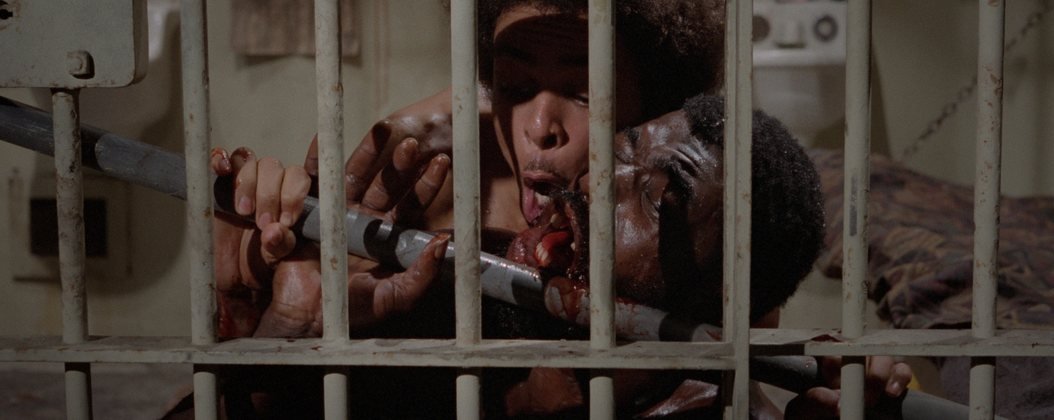 However, there is more to Penitentiary than the experimental nature of its storytelling choices. Beneath the eccentric elements of his tale, Fanaka uses the prison and boxing ring elements to create a commentary on how the American prison system feeds on the black male populace. It also offers a metaphor for the need to fight in an unjust society, even if there is no obvious way to prevail, if only to maintain a sense of self-worth. This is powerfully expressed via a subplot where Too Sweet counsels Eugene (Thommy Price), a young prisoner treated as a punk by the others, to stand up for himself. It's unexpectedly moving to witness this character to go from being subservient to standing up for himself and ultimately becoming heroic on his own terms. It's also interesting to note the film's frank, matter-of-fact approach to homosexuality in prison, which is oft reminscent of how Short Eyes deals with the topic (both were ahead of the curve).The cast plays a crucial part in helping Fanaka communicate both the themes and the larger-than-life mood of his story. Kennedy makes a compelling lead, underplaying in a manner that differs from the rest of the cast, while Djola makes a terrifying henchman and Price's transformation from mouse to man draws the audience in. Equally worthy of note is Amos, who gives a complex performance as a top con who is aware of his need to maintain control over his charges. Elsewhere, future Porky's villain Mitchell is effortlessly convincing as the main face of the prison hierarchy and White is as hilarious as he is colorful.
However, there is more to Penitentiary than the experimental nature of its storytelling choices. Beneath the eccentric elements of his tale, Fanaka uses the prison and boxing ring elements to create a commentary on how the American prison system feeds on the black male populace. It also offers a metaphor for the need to fight in an unjust society, even if there is no obvious way to prevail, if only to maintain a sense of self-worth. This is powerfully expressed via a subplot where Too Sweet counsels Eugene (Thommy Price), a young prisoner treated as a punk by the others, to stand up for himself. It's unexpectedly moving to witness this character to go from being subservient to standing up for himself and ultimately becoming heroic on his own terms. It's also interesting to note the film's frank, matter-of-fact approach to homosexuality in prison, which is oft reminscent of how Short Eyes deals with the topic (both were ahead of the curve).The cast plays a crucial part in helping Fanaka communicate both the themes and the larger-than-life mood of his story. Kennedy makes a compelling lead, underplaying in a manner that differs from the rest of the cast, while Djola makes a terrifying henchman and Price's transformation from mouse to man draws the audience in. Equally worthy of note is Amos, who gives a complex performance as a top con who is aware of his need to maintain control over his charges. Elsewhere, future Porky's villain Mitchell is effortlessly convincing as the main face of the prison hierarchy and White is as hilarious as he is colorful.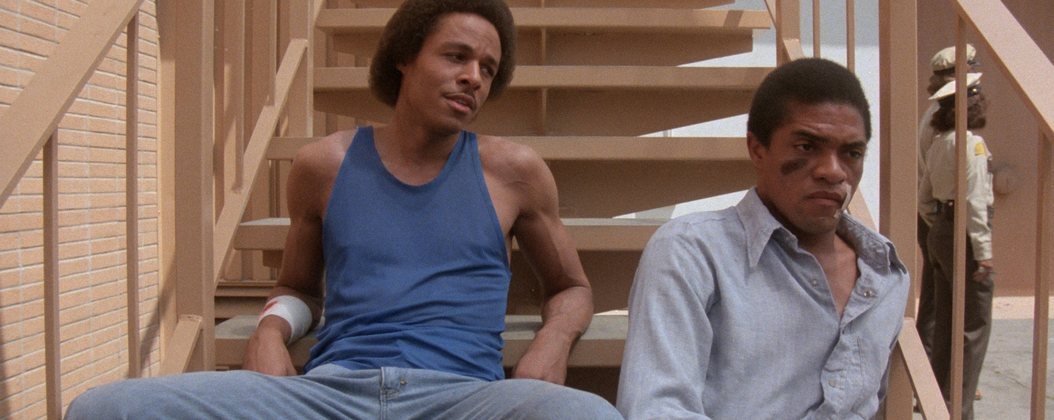 Finally and most importantly, Penitentiary works because it is a rousing, crowd-pleasing piece of work. Fanaka keeps his offbeat tale moving steadily forward, never running out of plot hooks or offbeat elements to entice the audience with, and gets a consistently engaged level of performance from his cast.He also understands how to use fight scenes to pump the audience up. The boxing ring fights are staged in a memorably unorthodox way, using the carnival atmosphere Fanaka creates to give them a surreal edge, but the best action moment in the film is the scene where Too Sweet and Half Dead have an all-out brawl in a cell. It's a mini-movie unto itself laid out in a believably messy style, with plenty of blood, sweat and shouting. It's one of the best fights ever in a grindhouse flick, something you might wish you could go back in time and watch with a 42nd street grindhouse crowd.In short, Fanaka might not get the amount of respect he deserves from historians but Penitentiary will always be a legend with the cult movie heads. Forty years after the fact, its gutsy, defiantly oddball style and surprisingly serious themes still communicate with the same intensity.
Finally and most importantly, Penitentiary works because it is a rousing, crowd-pleasing piece of work. Fanaka keeps his offbeat tale moving steadily forward, never running out of plot hooks or offbeat elements to entice the audience with, and gets a consistently engaged level of performance from his cast.He also understands how to use fight scenes to pump the audience up. The boxing ring fights are staged in a memorably unorthodox way, using the carnival atmosphere Fanaka creates to give them a surreal edge, but the best action moment in the film is the scene where Too Sweet and Half Dead have an all-out brawl in a cell. It's a mini-movie unto itself laid out in a believably messy style, with plenty of blood, sweat and shouting. It's one of the best fights ever in a grindhouse flick, something you might wish you could go back in time and watch with a 42nd street grindhouse crowd.In short, Fanaka might not get the amount of respect he deserves from historians but Penitentiary will always be a legend with the cult movie heads. Forty years after the fact, its gutsy, defiantly oddball style and surprisingly serious themes still communicate with the same intensity.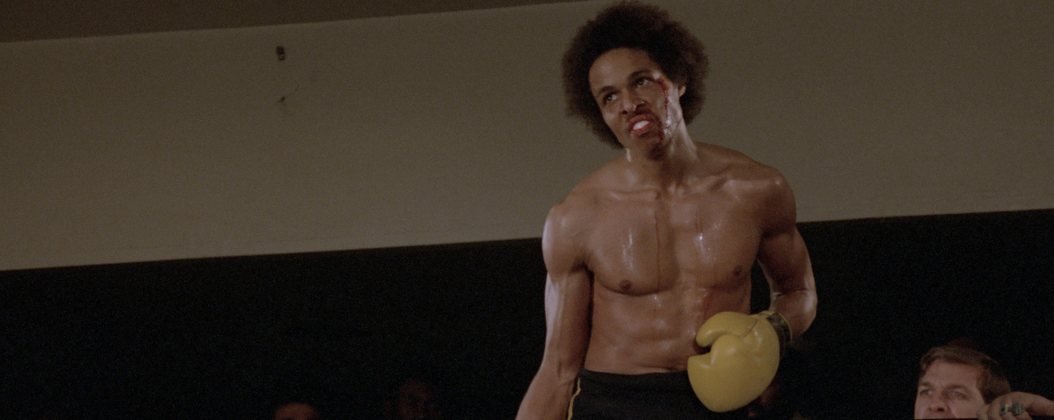 Blu-Ray Notes: Vinegar Syndrome has released an excellent blu-ray/DVD combo set of this title that bests all previous editions. It's got a fresh 4K transfer from the negative, two commentary tracks (one by Fanaka) and a trio of new interviews, including a sitdown with Kennedy. Highly recommended.
Blu-Ray Notes: Vinegar Syndrome has released an excellent blu-ray/DVD combo set of this title that bests all previous editions. It's got a fresh 4K transfer from the negative, two commentary tracks (one by Fanaka) and a trio of new interviews, including a sitdown with Kennedy. Highly recommended.


